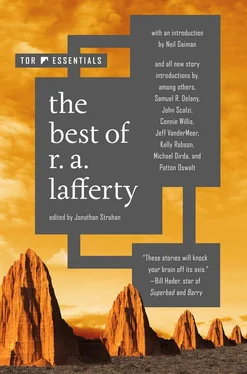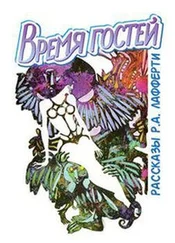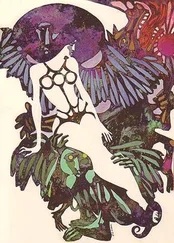Rockwell gasped once and nearly fell off the vehicle. He had seen a total stranger riding beside him, and it shook him.
Then he saw that it was Smith as he had always been, and he was dumbfounded by the illusion. And, soon, by something else.
“Something is very wrong here,” Rockwell said.
“Something is very right here,” Smith answered him, and then broke into another song in an Indian tongue.
“We’re lost,” Rockwell worried out loud. “We can’t see any distance for the rain, but there shouldn’t be rising ground here. It isn’t mapped.”
“Of course it is,” Smith sang. “It’s the Jalo Char.”
“The what? Where did you get a name like that? The map’s a blank here, and the country should be.”
“Then the map is defective. Man, it’s the sweetest valley in the world! It will lead us all the way up. How could the map forget it? How could we all forget it for so long?”
“Smith! What’s wrong? You’re pie-eyed.”
“Everything’s right, I tell you. I was reborn just a minute ago. It’s a coming home.”
“Smith! We’re riding through green grass.”
“I love it. I could crop it like a horse.”
“That cliff, Smith! It shouldn’t be that close! It’s part of the mir—”
“Why, sir, that is Lolo Trusul.”
“But it’s not real! It’s not on any topography map!”
“Map, sir? I’m a poor kalo man who wouldn’t know about things like that.”
“Smith! You’re a qualified cartographer!”
“Does seem that I followed a trade with a name like that. But the cliff is real enough. I climbed it in my boyhood—in my other boyhood. And that yonder, sir, is Drapengoro Rez—the Grassy Mountain. And the high plateau ahead of us which we begin to climb is Diz Boro Grai—the Land of the Great Horses.”
Rockwell stopped the terrain buggy and leaped off. Smith followed him in a happy daze.
“Smith, you’re wide-eyed crazy!” Rockwell gasped. “And what am I? We’re terribly lost somehow. Smith, look at the log chart and the bearings recorder!”
“Log chart, sir? I’m a poor kalo man who wouldn’t know—”
“Damn you, Smith, you made these instruments. If they’re correct we’re seven hundred feet too high and have been climbing for ten miles into a highland that’s supposed to be part of a mirage. These cliffs can’t be here. We can’t be here. Smith!”
But Seruno Smith had ambled off like a crazy man.
“Smith, where are you trotting off to? Can’t you hear me?”
“You call to me, sir?” asked Smith. “And by such a name?”
“Are the two of us as crazy as the country?” Rockwell moaned. “I’ve worked with you for three years. Isn’t your name Smith?”
“Why, yes, sir, I guess it might be englished as Horse-Smith or Black-Smith. But my name is Pettalangro and I’m going home.”
And the man who had been Smith started on foot up to the Land of the Great Horses.
“Smith, I’m getting on the buggy and I’m going back,” Rockwell shouted. “I’m scared liverless of this country that changes. When a mirage turns solid it’s time to quit. Come along now! We’ll be back in Bikaner by tomorrow morning. There’s a doctor there, and a whiskey bar. We need one of them.”
“Thank you, sir, but I must go up to my home,” Smith sang out. “It was kind of you to give me a ride along the way.”
“I’m leaving you, Smith. One crazy man is better than two.”
“Ashava, Sarishan,” Smith called a parting.
“Smith, unriddle me one last thing,” Rockwell called, trying to find a piece of sanity to hold to. “What is the name of the seventh sister?”
“Deep Romany,” Smith sang, and he was gone up into the high plateau that had always been a mirage.
In an upper room on Olive Street in St. Louis, Missouri, a half-and-half couple were talking half-and-half.
“The rez has riser’ d,” the man said. “I can sung it like brishindo. Let’s jal. ”
“All right,” the wife said, “if you’re awa. ”
“Hell, I bet I can riker plenty bano on the beda we got here. I’ll have kakko come kinna it aro. ”
“With a little bachi we can be jal’ d by areat, ” said the wife.
“ Nashiva, woman, nashiva !”
“All right,” the wife said, and she began to pack their suitcases.
In Camargo in the Chihuahua State of Mexico, a shade-tree mechanic sold his business for a hundred pesos and told his wife to pack up—they were leaving.
“To leave now when business is so good?” she asked.
“I only got one car to fix and I can’t fix that,” the man said.
“But if you keep it long enough, he will pay you to put it together again even if it isn’t fixed. That’s what he did last time. And you’ve a horse to shoe.”
“I’m afraid of that horse. It has come back, though. Let’s go.”
“Are you sure we will be able to find it?”
“Of course I’m not sure. We will go in our wagon and our sick horse will pull it.”
“Why will we go in the wagon, when we have a car, of sorts?”
“I don’t know why. But we will go in the wagon, and we will nail the old giant horseshoe up on the lintel board.”
A carny in Nebraska lifted his head and smelled the air.
“It’s come back,” he said. “I always knew we’d know. Any other Romanies here?”
“I got a little rart in me,” said one of his fellows. “This narvelengero dives is only a two-bit carnival anyhow. We’ll tell the boss to shove it up his chev and we’ll be gone.”
In Tulsa, a used-car dealer named Gypsy Red announced the hottest sale on the row:
“Everything for nothing! I’m leaving. Pick up the papers and drive them off. Nine new heaps and thirty good ones. All free.”
“You think we’re crazy?” the people asked. “There’s a catch.”
Red put the papers for all the cars on the ground and put a brick on top of them. He got in the worst car on the lot and drove it off forever.
“All free,” he sang out as he drove off. “Pick up the papers and drive the cars away.”
They’re still there. You think people are crazy to fall for something like that that probably has a catch to it?
In Galveston a barmaid named Margaret was asking merchant seamen how best to get passage to Karachi.
“Why Karachi?” one of them asked her.
“I thought it would be the nearest big port,” she said. “It’s come back, you know.”
“I kind of felt this morning it had come back,” he said. “I’m a chal myself. Sure, we’ll find something going that way.”
In thousands of places fawney-men and dukkerin-women, kakki-baskros and hegedusies, clowns and commission men, Counts of Condom and Dukes of Little Egypt parvel’ d in their chips and got ready to roll.
Men and families made sudden decisions in every country. Athinganoi gathered in the hills above Salonika in Greece and were joined by brothers from Serbia and Albania and the Rhodope Hills of Bulgaria. Zingari of north Italy gathered around Pavia and began to roll toward Genoa to take ship. Boêmios of Portugal came down to Porto and Lisbon. Gitanos of Andalusia and all southern Spain came to Sanlúcar and Málaga. Zigeuner from Thuringia and Hanover thronged to Hamburg to find ocean passage. Gioboga and their mixed-blood Shelta cousins from every cnoc and coill of Ireland found boats at Dublin and Limerick and Bantry.
From deeper Europe, Tsigani began to travel overland eastward. The people were going from two hundred ports of every continent and over a thousand highroads—many of them long forgotten.
Читать дальше




![Рафаэль Лафферти - Дни, полные любви и смерти. Лучшее [сборник litres]](/books/385123/rafael-lafferti-dni-polnye-lyubvi-i-smerti-luchshe-thumb.webp)
![Рафаэль Лафферти - Лучшее [Сборник фантастических рассказов]](/books/401500/rafael-lafferti-luchshee-sbornik-fantasticheskih-ra-thumb.webp)